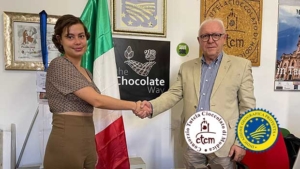
The first internship - IILA-MAECI/DGCS 2022-2023 scholarship promoted by the International Italian-Latin American Organization (IILA) , with funding from the General Directorate for Development Cooperation of the Ministry of Foreign Affairs and Cooperation, takes place in Modica International of Italy (DGCS/MAECI) which every year grants scholarships to citizens of Latin American countries that are members of the IILA, who wish to carry out post-university specialization and/or refresher internships.
The internship, lasting four months, is carried out by Dr. Paola De Los Ángeles Quesada Arguedas , a student of the National University of Costa Rica who is carrying out a research project, whose coordinator is Prof. Carlos Eduardo Hernandez , with the aim of demonstrating the relevance of possible geographical indications of Mesoamerican cocoa in the European artisanal chocolate market. In particular, it aims to systematize the evidence on the role of artisan chocolatiers and the relevance of GIs in the context of the bean-to-bar trend that could further position Mesoamerican cocoas in Europe.
The Chocolate Way – states President Nino Scivoletto – expresses its satisfaction in being able to host Dr. Quesada, and makes available, through the Consortium for the Protection of Modica PGI Chocolate, a member of the Association, the experience of the PGI certification of chocolate from Modica, so that we can also work towards obtaining an IGP/DOP certification of one or more cocoa production districts in Costa Rica. This internship – continues Scivoletto – could translate into a real cooperation initiative between Italy and Costa Rica, on the one hand, and between TCW, the National University of Costa Rica and the IILA on the other, concretizing in practice the objectives set out in the Collaboration Agreement signed by me in 2021 with the Secretary General of the IILA , Antonella Cavallari .
After the first month of training activity, a first verification call was held in which professor Carlos Eduardo Hernàndez participated and highlighted: "cocoa is a crop of historical importance and has a botanical origin in Mesoamerica, but it linked to situations of social vulnerability and areas of poverty. Furthermore, despite the vast cocoa production in Central America, it represents less than 1% of the global market share of this product. Chocolate productions that use cocoa from Central America and which do not refer to their origin or which refer to it informally are widespread, which is why the need to implement formal geographical traceability tools emerges. The National University, continues Hernàndez – has a research center on quality labels of geographical origin that has had experience in crops important at a national level, as in the case of Tarrazú coffee (designation of origin). We want to use this experience to formalize traceability tools in the case of Mesoamerican cocoa. The purpose of the Quesada student's internship is to validate these tools for the European market, drawing on the experience gained by the Modica Chocolate Protection Consortium in the field of European Geographical Indication certification.
Tutor of the training project is Dr. Paola Cicero , Secretary of the TCW Board of Directors, who will guide the intern Paola De Los Ángeles Quesada Arguedas (in the photo with the President Scivoletto), alternating the training activity between the Consortium/TCW headquarters and the companies producers of Modica PGI chocolate; training calls are planned with the managers of the Control Body - CSQA - and the technical consultant of the CTCM, doctor Davide Guarnaccia.
Source: Modica Chocolate Protection Consortium